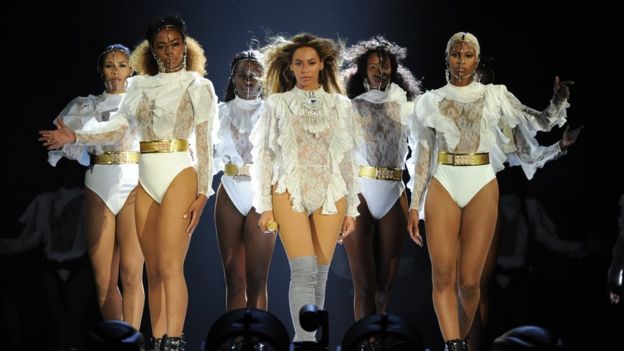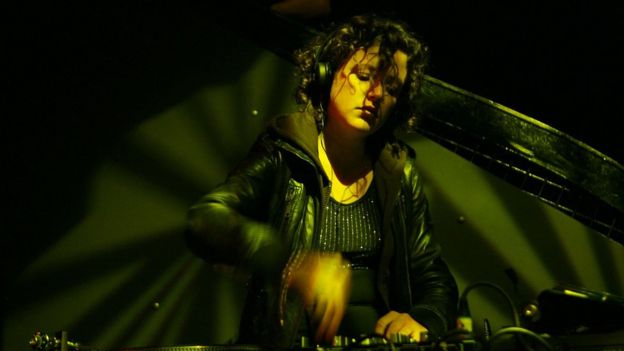
For years, Beyonce was a hit-machine, defiantly, almost psychotically, churning out chart topping singles. So how, and why, did she become focussed exclusively on the album format? And what does that mean in the age of streaming?
"I might get your song played on the radio station," boasts Beyonce on Formation, the agenda-setting single she premiered at this year's SuperBowl - but her own songs are increasingly failing to make the airwaves.
In the last month, the Texan superstar has been played more than 2,000 times on UK radio, yet her most popular tracks are more than a decade old: Irreplaceable (219 plays), Crazy In Love (186), Independent Women (163).
It is five years since she had a top five hit in the UK, and eight since her last number one - 2008's If I Were A Boy.
"If you compare her to other pop stars like Rihanna, she hasn't really had a defining hit in a long time," says Michael Cragg, features editor at Popjustice.
To the casual observer that looks like bad news but here's the thing: Beyonce opted out of the chart race voluntarily.
I think when you make a Crazy In Love or a Single Ladies, then there's nowhere else to go in the world of traditional pop music," says BBC Radio 1's Annie "You have to try and evolve as an artist and push yourself further conceptually and musically. She is growing up and getting more spiritual within herself and her music."
In practice, that means Beyonce has become an "albums artist" - making bold, long-form records that tackle weighty topics such as black identity, body image, feminism and marital fidelity (or otherwise).
Her new album Lemonade and its predecessor, 2013's Beyonce, work best as song suites, where atmosphere and narrative take precedence over smash and grab pop hooks.
"They're dramatic songs," says Cragg. "You can build a visual around it, but there's not much there for the casual fan."
So what prompted the change in direction?
 AP
AP
The catalyst was 4, the star's fourth solo record. Released in 2011, it was a grab-bag of musical styles and genres, from the sonically dissonant Run The World (Girls) to the soul throwback Love On Top.
"Everything sounds the same on the radio," Beyonce told Complex magazine when it was released. "With 4 I tried to mix R&B from the '70s and the '90s with rock and roll and a lot of horns to create something new and exciting. I wanted musical changes, bridges, vibrata, live instrumentation and classic songwriting."
But the record was incoherent, unfocussed and - by Beyonce's standards - a commercial flop. 4 sold three million copies, less than half as many as its predecessor, and it failed to produce an enduring radio hit.
"4 was the turning point," says Cragg. "She realised it didn't make the impact she should be making at that point in her career."
What followed was a long period of confusion and experimentation.
More than 50 tracks were auditioned, recorded and scrapped for Beyonce's fifth, self-titled album in 2013. A tour to promote the record launched without a record to promote, and racked up 100 dates before the album finally appeared, unannounced, on iTunes.
Accompanied by 17 music videos, the album was unlike anything the star had ever released before - and its genesis was woven into the lyrics
"All the [stuff] I do is boring," she said on Ghost. "All these record labels? Boring."
The album is defiantly, wilfully anti-pop, relying on complex sonic textures and fragments of fragments of songs. It's as if Beyonce split the musical atom and taped the fall out.
It was lyrically bold, too, as the star pulled back the veil on her innermost thoughts - essentially, "I am a fully paid-up feminist who enjoys ornate sex with Jay Z".
 Reuters
Reuters
"Part of the criticism of Beyonce was that she's too perfect and too meticulous and no-one really knows anything about her," says Cragg.
"You could do that in the '80s. You could be Michael Jackson and you could be slightly aloof. But she realised she needs to communicate something about herself to people."
It worked. Beyonce not only sold five million copies worldwide, but it raised the singer's prestige as an artist and cultural provocateur.
Vindicated by the success, "Queen Bey" started work on an even more arresting album.
Lemonade, released last Sunday, is an intimate, anguished document of marital betrayal, in which Beyonce comes to regret the day Jay Z "put a ring on it".
It finds her angry, defiant, lost, vengeful and, finally, reconciled with her husband. Once again, it is an album with a complex narrative arc. An album that demands to be heard in one sitting. An album without a clearly-defined single.
But Beyonce's power is such that radio celebrated the release anyway. On Monday,Annie Mac played the album in its entirety on her Radio 1 show.
"It's a huge album for us culturally and musically, and she is one of the biggest acts in the world," says the DJ. "I also thought thematically it was interesting, as she has a lot to say both personally and politically."

"Annie Mac's listening party was genius," says Coral Williamson, from industry paper Music Week. "Much in the same way that Beyonce has created a deeper body of work, a listening party turns the release into an event, that - despite some streaming service's best attempts - every fan can take part in.
"Radio is adapting to the digital age by trying new things and relying less on singles. Creating a talking point through such programming can only be a good thing."
"It's something we are going to be doing a lot more," says Mac. "On her last album Beyonce started a pattern of the 'surprise release'. Now it's the norm for big US artists to do it this way - Kendrick [Lamar], Rihanna, Drake etc." (Indeed, Radio 1 held another listening party for Drake's latest album, Views, on Friday.)

But in the era of streaming, is anyone actually listening to these albums?
"While most industry experts would tell you that listeners prefer streaming individual tracks, it's a two-tiered system," says music journalist Eve Barlow.

"There are fair-weather Beyonce fans who might only be interested in her biggest hits, as they've always been. But this album might not be for those fans at all. Increasingly there's the upper tier of Beyonce acolytes who want to delve deeper and truly immerse themselves in the experience.
"For the right artist, there remains a hunger for the full album."
0 Response to "How Beyonce became an 'albums artist' - and what radio is doing about it"
Post a Comment